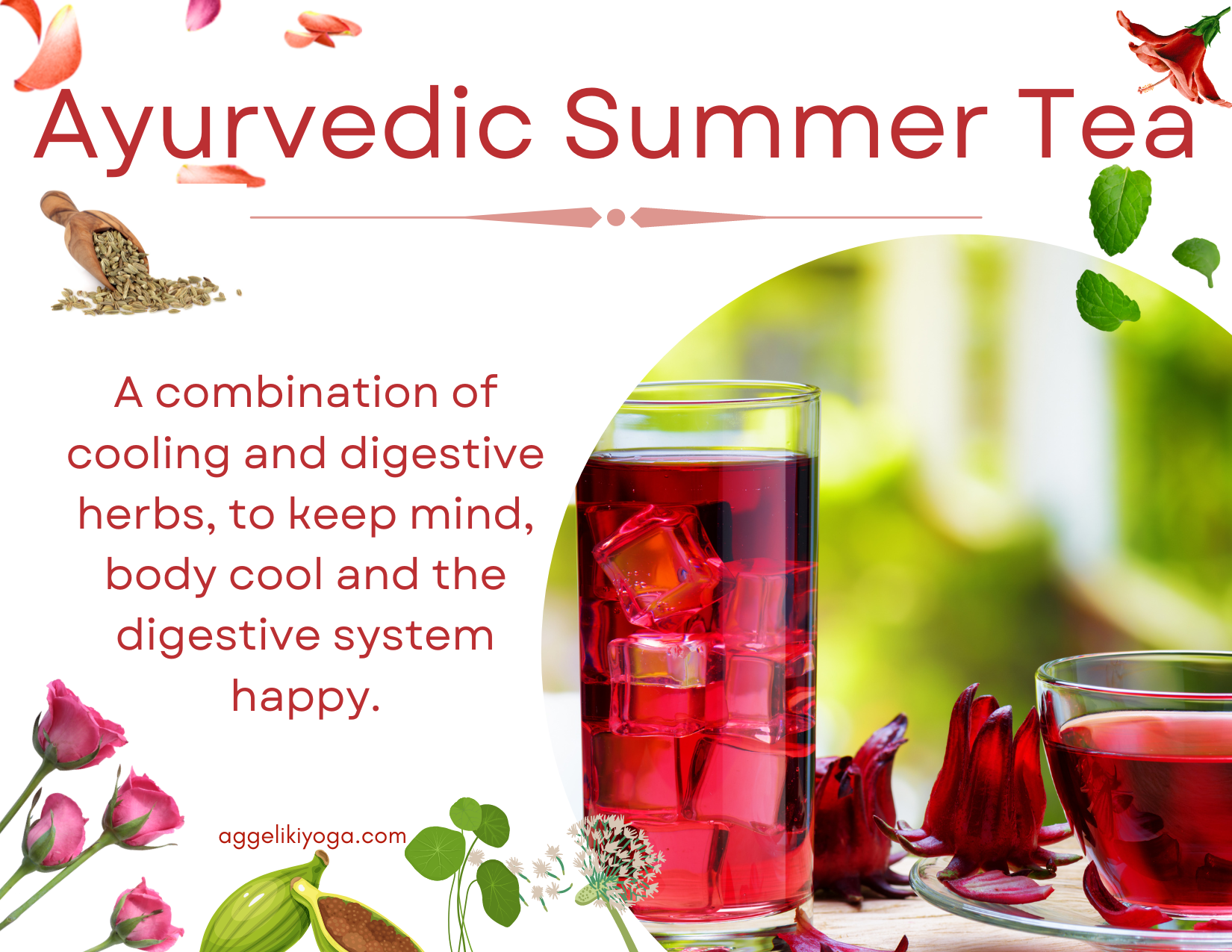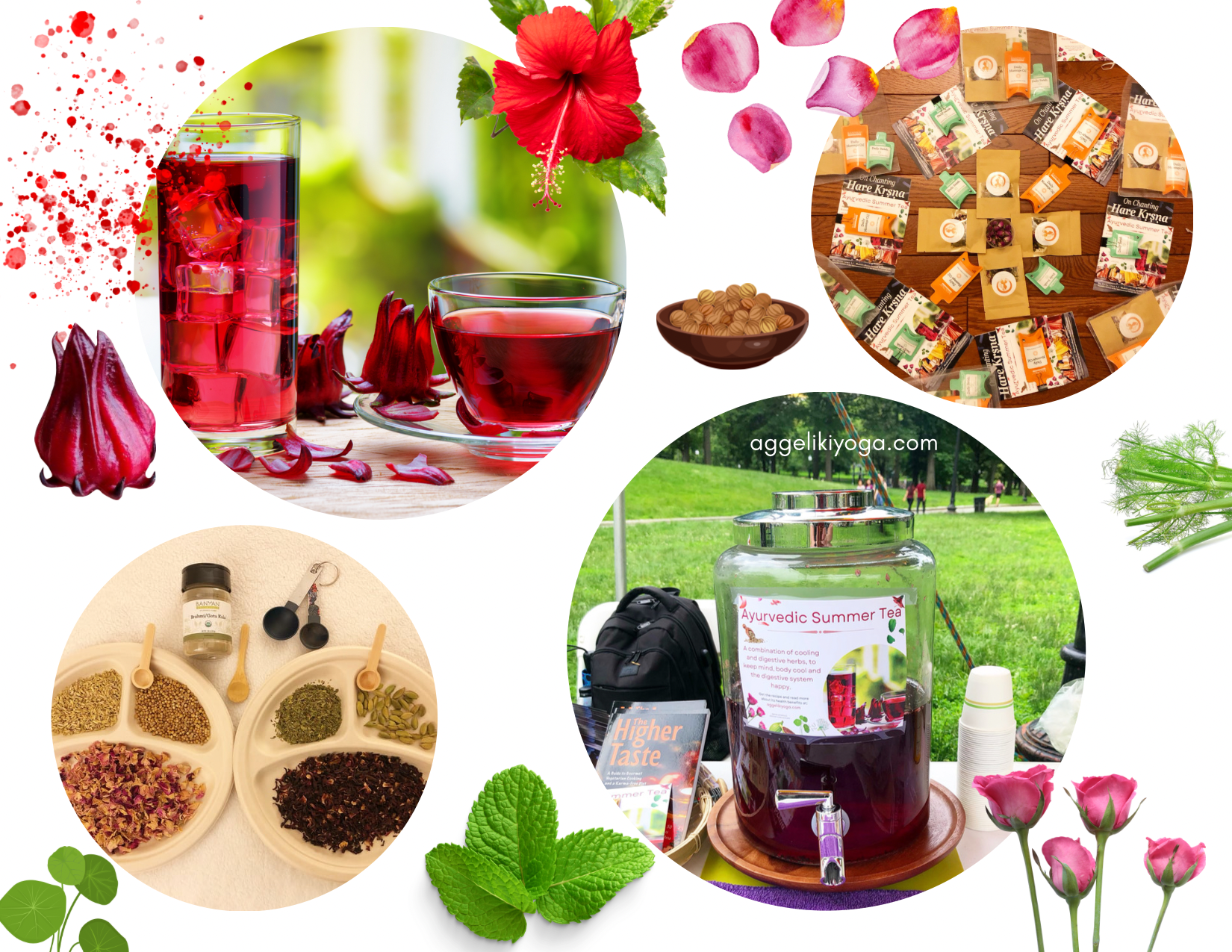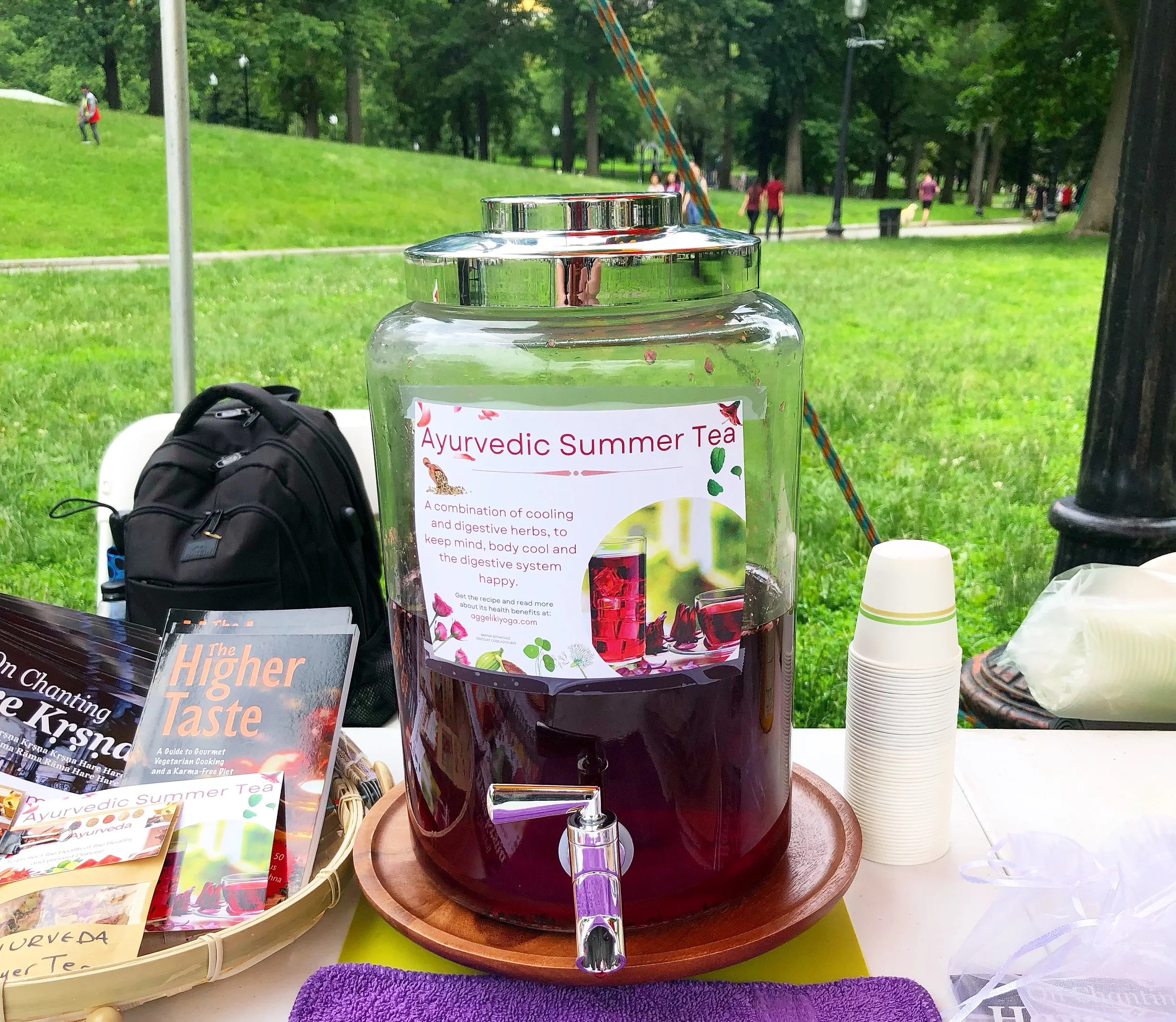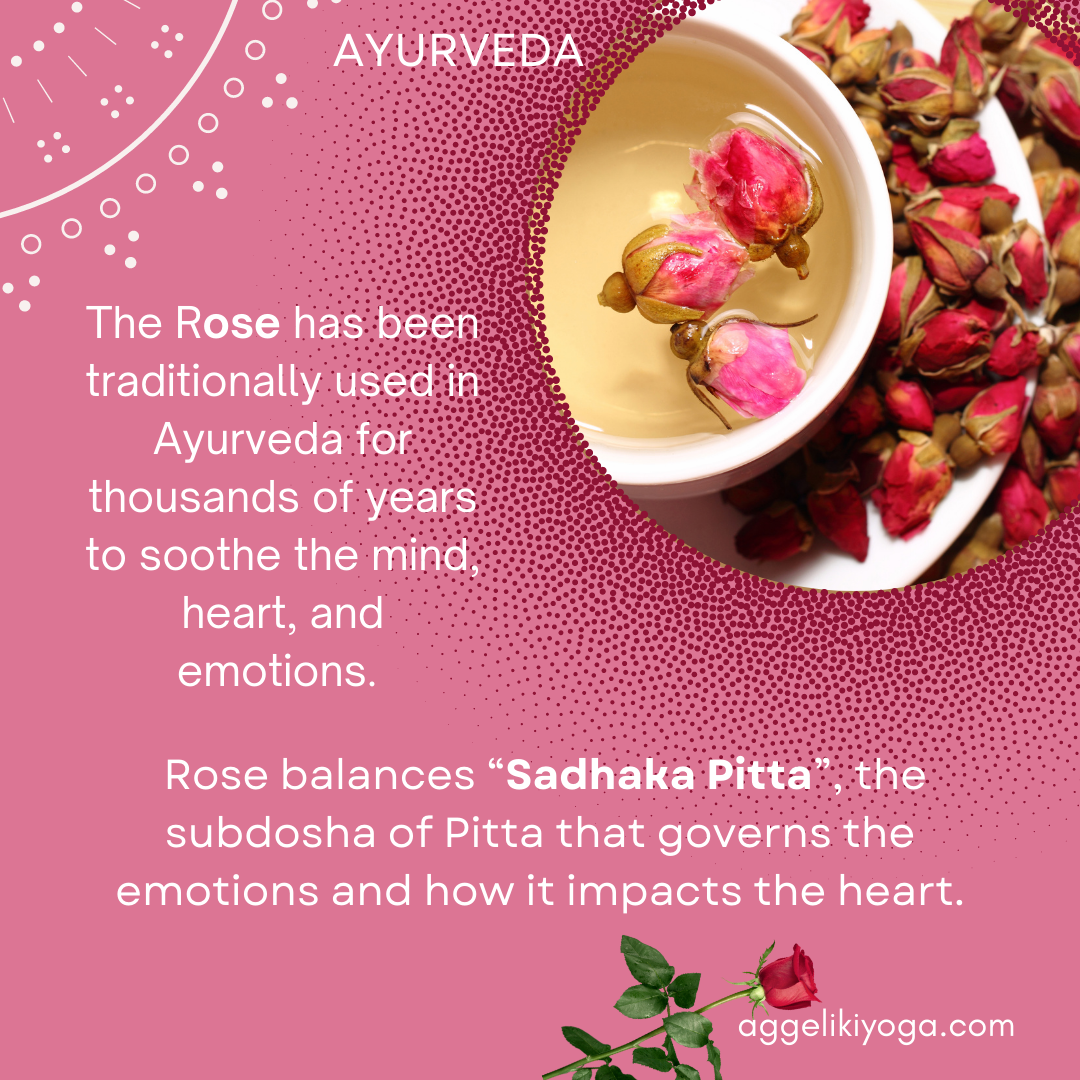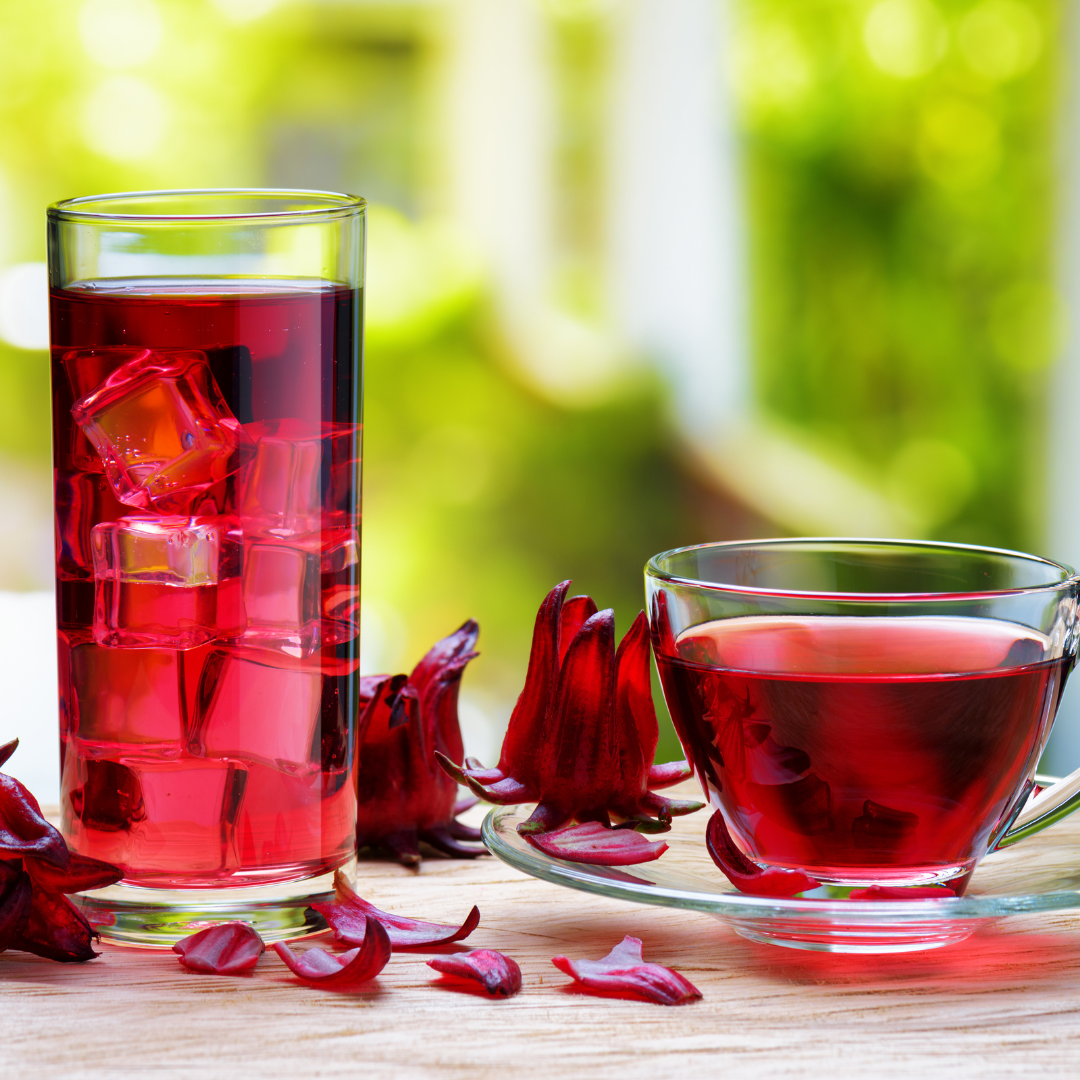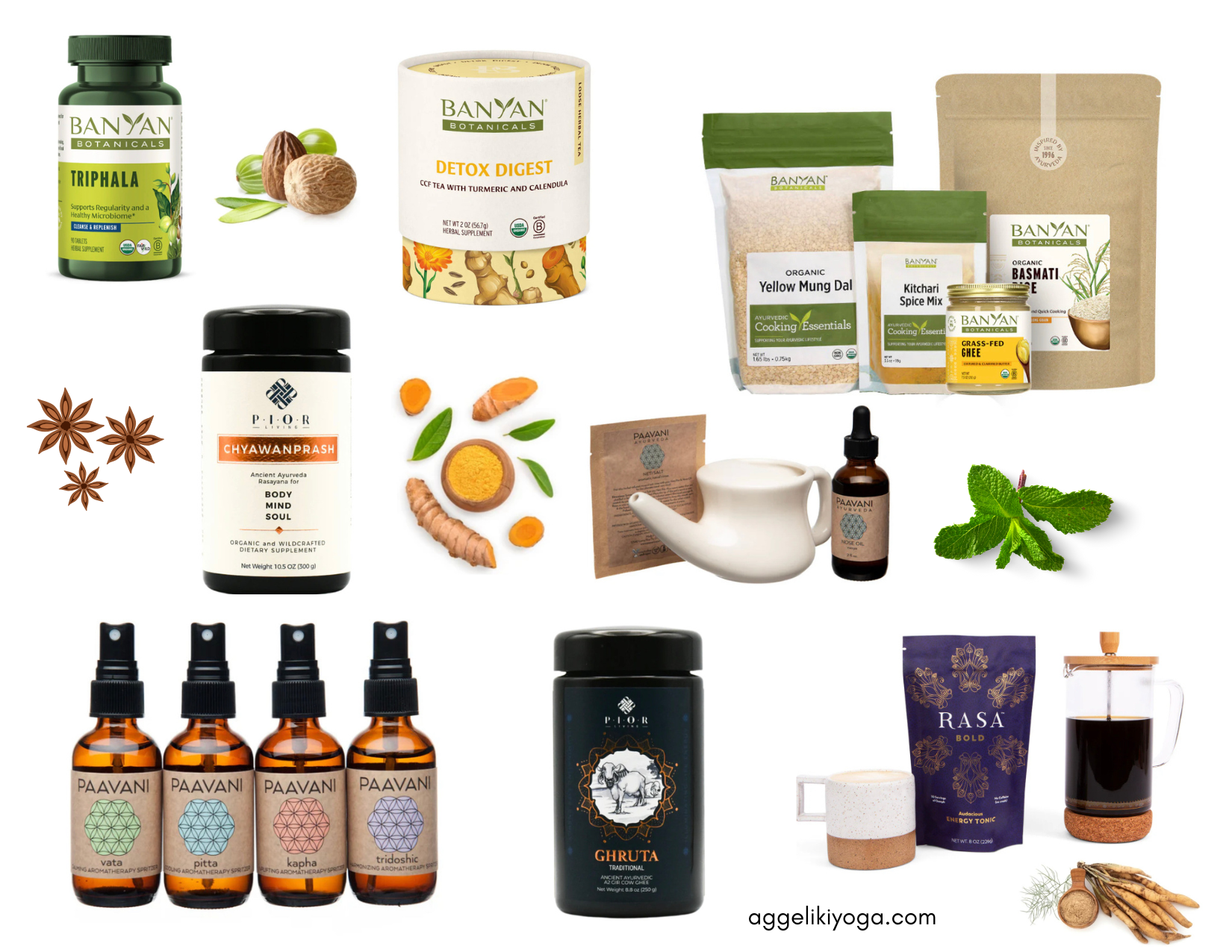Ayurvedic Summer Tea
Keep Body and Mind Cool this Summer Season
According to Ayurveda, the Summer known as the Pitta season is governed predominantly by the Fire and Water elements. The elements that make up Pitta Dosha one of the three constitutions. Pitta is responsible for the body's metabolism and digestion. All doshas in Ayurveda have different Gunas or qualities.
An Ayurvedic principle states that “like increases like”, while “opposites bring balance”. So in order to balance a particular dosha, we must cultivate the Gunas / qualities opposite to the dosha we’re trying to balance. To achieve this, we adapt our diet and lifestyle.
The Gunas - Qualities of Pitta Season are: hot, sharp, light, pungent, liquid, and mobile.
Tastes that balance the qualities of Pitta Season: sweet, bitter, astringent.
Ayurvedic Summer Tea helps to keep the mind, and body cool and the digestive system happy.
You can enjoy this tea anytime of the season if you are experiencing Pitta dosha imbalances. Herbs like coriander and fennel help with digestion which is the cornerstone in Ayurveda. Pitta related digestion issues could be heartburn, sour burps, indigestion, and acid reflux. Hibiscus helps to purify the blood “rakta dhatu” one of the seven tissues in Ayurveda that has affinity with Pitta dosha, and its astringent taste has cleansing qualities for the liver which according to Ayurveda is a Pitta organ.
Pitta imbalances can be caused by a diet high in spicy foods, salt, coffee and alcohol. But also can be caused by high stress levels even if someone’s diet is balanced. If the individual’s dominant constitution is Pitta stress can vitiate the dosha. Rose and brahmi in this tea help to calm the mind which according to Ayurveda is located in the heart “hridaya” and both herbs have cooling qualities.
Potential Signs of Imbalanced Pitta
acid reflux
sour burps
red skin or rosacea
loose stools
painful menstrual cramps
inflammation
excessive anger or irritation
burning eyes
The Herbs and their Qualities
Hibiscus, rose, spearmint and brahmi are the cooling herbs. Coriander, fennel and cardamom are the digestive herbs.
HIBISCUS
According to Ayurvedic science, hibiscus has a sweet and astringent taste (rasa), a cooling energetic effect (virya) and a sweet post digestive effect (vipaka) making it an ideal herb for Pitta dosha and Pitta season. It is used to make cooling summer beverages as it can help reduce heat and fever.
It purifies the blood, removes excess heat from the body and supports proper function of the kidneys. Excess heat in the body especially the head can cause hair fall and hibiscus is one of the herbs that helps support healthy hair. Hibiscus' astringent and slightly bitter taste helps cleanse the liver, which according to Ayurveda is a Pitta organ and a major cleansing organ, that can be overheated due to stress, food choices and lifestyle. Enjoying hibiscus beverages during the hot months can help purify and keep the body and mind cool.
Therapeutic Benefits
purifies the blood and helps remove excess heat from the body
supports healthy skin and a clear complexion
good for first and second chakra disorders such as problems with kidneys and reproductive system due to heat and congestion
supports healthy hair growth and prevents hair loss a potential Pitta imbalance
Ayurvedic Energetics
rasa - taste: kashaya (astringent), madhura (sweet)
guna- physical property : laghu (light)
virya- potency : sita (cooling)
vipaka - post digestive effect: madhura (sweet)
doshas- constitutions: balancing Pitta and Kapha may vitiate Vata in excess
ROSE
The rose has been traditionally used in Ayurveda for thousands of years to soothe the mind, heart, and emotions. Rose balances “Sadhaka Pitta”, the subdosha of Pitta that governs the emotions and how it impacts the heart.
Due to its cooling virya - potency, as well as bitter and astringent taste, it is pacifying for Pitta dosha. When used over time, rose pacifies the heat in the blood, and keeps imbalances in the skin from flaring up. In Ayurveda, rose is also used as a remedy for the physical circulatory system. It is a cardio-tonic, called a “hridaya.” It can be beneficial for the eyes, a Pitta site in the body. In Ayurveda the eyes are connected with the element of fire and rose internally as a tea and externally as a rose spray for the eyes can be very beneficial. It can help with headaches related to Pitta aggravation, and acne caused by Pitta imbalances.
Therapeutic Benefits
soothes inflamed skin
pacifies heat in the body
reduces inflammation of eyes and skin
it has antibacterial and antiseptic properties
good for the heart and emotions
Ayurvedic Energetics
rasa - taste: tikta (bitter), kashaya (astringent), madhura (sweet)
guna- physical property : laghu (light), snigdha (unctuous)
virya- potency : sita (cooling)
vipaka - post digestive effect: madhura (sweet)
doshas- constitutions: balancing all doshas, helps to keep vata and kapha balanced and pacifies pitta
CORIANDER
It is an effective digestive agent for Pitta conditions in which most spices are contraindicated. It is one of the best herbs, in enkindling digestive fire while simultaneously cooling and soothing the GI tract.
It removes excess heat in the body making it an ideal herb for Pitta associated symptoms such as heartburns, sour burps and excellent for Pitta season. It is one of the herbs that is recommended for before and after a meal to help with both better digestion, assimilation and absorption of nutrients.
Therapeutic Benefits
improves digestive fire without aggravating Pitta
fights indigestion and nausea
diuretic; effective in proper function of kidneys and urine retention
eliminates excess heat from the body and mind
cools and soothes the GI tract
carminative; prevents gas and bloating
Ayurvedic Energetics
rasa - taste: tikta (bitter), katu (pungent), madhura (sweet)
guna- physical property/ qualities : laghu (light), snigdha (unctuous)
virya- potency : sita (cooling)
vipaka - post digestive effect: katu (pungent)
doshas- constitutions : balances all doshas VPK
FENNEL
Fennel has similar qualities and benefits with coriander. It is effective in stopping cramping and dispeling flatulence. It is one of the three herbs that is used in the traditional Ayurvedic CCF (coriander, cumin, fennel) tea, that supports healthy digestion and elimination.
It is a nerve tonic that helps to calm the mind and increases clarity of consciousness. Fennel is calming to the nerves and its pleasant aroma acts upon the mind and promotes mental alertness.
Therapeutic Benefits
improves digestive fire without aggravating Pitta
carminative; prevents gas and bloating
soothes abdominal pain, flatulence, indigestion and colic
diuretic; supports healthy urination
pacana; supports a comfortable post meal experience
Ayurvedic Energetics
rasa - taste: sweet, pungent, bitter
guna- physical property : laghu (light), snigdha (unctuous)
virya- potency : sita (cooling)
vipaka - post digestive effect: madhura (sweet)
doshas- constitutions: balancing all doshas, especially Vata in the GI tract
CARDAMOM
If I had to choose one herb as my top favorite that would be cardamom. Its sweet aroma stimulates the mind and heart. It has cooling qualities for both body and mind and it is a digestive herb that balances all three doshas.
It stimulates samana vayu, enkindles digestive fire and removes mucus from the stomach and lungs. It is particularly good for opening and soothing the flow of the 5 directions of prana in the body.
Therapeutic Benefits
promotes healthy appetite and is an excellent mouth freshener
relieves burning sensation in the skin
reduces the acidity of coffee and black tea
reduces gas
supports healthy breathing
Ayurvedic Energetics
rasa - taste: katu (pungent), madhura (sweet)
guna- physical property : laghu (light), ruksa (dry)
virya- potency : usna (slightly heating)
vipaka - post digestive effect: madhura (sweet)
doshas- constitutions: balances all doshas
SPEARMINT
The three main mints are: peppermint, spearmint and horsemint. Spearmint is my favorite. It has a sweet and calming aroma. It is more relaxing and better in diuretic action.
All mints are cooling for the digestive system and the mind. They have the ability to relax the muscles surrounding the intestine and act as an effective cure for symptoms of irritable bowel syndrome like indigestion and dyspepsia. It can help with Pitta digestion issues like heartburns and sour burps.
Therapeutic Benefits
diuretic
carminative; prevents gas and bloating
clears the head
soothes digestion
cooling effect for the skin
improves oral health
Ayurvedic Energetics
rasa - taste: katu (pungent)
guna- physical property : laghu (light) ruksa (dry)
virya- potency : sita (cooling)
vipaka - post digestive effect: katu (pungent)
doshas- constitutions: balances pitta and kapha can aggravate vata when in excess
BRAHMI
Brahmi, also known as gotu kola, is a cooling and relaxing herb, making it an excellent tonic for Pitta. It is a natural blood purifier. Rakta dhatu - the blood tissue, one of the seven dhatus - tissues in Ayurveda has affinity with Pitta dosha. That makes brahmi an ideal herb for Pitta Season and Pitta dosha.
The leaves of Brahmi plant resemble cerebellum thus brahmi has a special affinity for the mind and the head making it also an ideal herb for hair loss related to stress and high levels of Pitta dosha. One of the Sanskrit meanings of the word brahmi is holy and divine and it is derived from Lord Brahma.
Therapeutic Benefits
supports memory, intellect, and concentration
potent nervine; supports proper function of the nervous system
has cooling and relaxing properties perfect for Pitta
Ayurvedic Energetics
rasa - taste: bitter, astringent, sweet
guna- physical property : laghu (light) ruksa (dry)
virya- potency : sita (cooling)
vipaka - post digestive effect: madhura (sweet)
doshas- constitutions: balancing for all doshas
How to make your Ayurvedic Summer Tea
If you got one of my samples you can either let it infuse in 1 cup of hot water (8 oz) for 10-15 minutes or boil it in low heat for 5-7 minutes. Have it warm or at room temperature.
Infusion: If you make it on your own, add all the ingredients except brahmi and let it infuse overnight then add ¼ of a teaspoon brahmi in the morning.
Best time to drink your tea would be during the Pitta time of the day 10:00 am - 2:00 pm. You don’t have to drink it all at once. It would be nice to start sipping on it, at 10:00 am until afternoon. Feel free to double the dose and sip on during the day.
Dosage: 1 teaspoon of hibiscus, 1 teaspoon of pink dried roses, ⅓ of a teaspoon spearmint or mint, ¼ of a teaspoon brahmi, ¼ tsp coriander seeds, ¼ tsp fennel seeds, 3 green cardamom pods.
Ayurveda recommends consuming drinks warm or at room temperature so we don’t aggravate “agni” the digestive fire. Having a cold drink on a hot summer day will give temporary relief and then we will just need more. The cooling qualities of this tea work on a deeper level to keep our system cool, hydrated and calm.
Easy ways and when on the go
Time is everything in our busy lives. When I am on the go and don’t have time I just use the hibiscus and brahmi powder from Banyan Botanicals. I will ask for a cup of hot water, I will add the mix and I will drink it warm (no hot) or at room temperature.
Other times I just infuse 4 of the ingredients overnight, (hibiscus, rose, coriander, fennel) and I sip on it during the day at room temperature. Even in hot days it feels refreshing because of the powerful qualities of the herbs. Infusing it overnight is my favorite method as it gives time to each ingredient to release their healing benefits on their own time.
Sweetener: Prefer to have your tea plain, but if you have to add some sweetness, Ayurveda recommends, coconut sugar for Summer days.
Summer Tips to stay in Balance
Reduce foods that are
Heating such spicy foods, raw tomatoes and onions, coffee, and alcohol.
Salty foods, himalayan pink salt is balancing for all 3 doshas but if you are experiencing high levels of pitta the ancient ayurvedic texts recommend soma salt.
Oily foods, anything fried or extensively fried, prefer to saute instead.
Sharp, acidic foods such as vinegar and other ferments like kombucha.
Sour foods such as sour dairy products like yogurt and hard cheeses.
Lifestyle Guidelines
Stay out of the midday sun
Spend time in nature early in the morning and evening
Explore barefoot walking in the morning, cool grass, or wet sand
Try moon bathing instead of sunbathing. The moon has cooling qualities
Consume natural electrolytes: coconut water, celery juice
Moderate exercise: swimming, gentle yoga, walking
Practice cooling breaths: sitali/sitkari, Chandra bhedana pranayama
Essential oils: rose, lavender, jasmine
Abhyanga: Ayurvedic self-oil massage with coconut oil, my favorite is coconut brahmi
1:1 Ayurvedic Health Counseling
Working together to create your unique Ayurvedic plan. Ayurveda recognizes that every individual is unique.
Schedule an Ayurvedic Consultation
Ayurvedic Summer Tea Tips on Instagram
Disclaimer :-) This information is for general educational purposes only and that no claim to medical diagnosis or treatment, or the cure of any medical condition, is inferred or implied.

